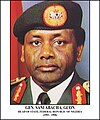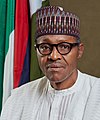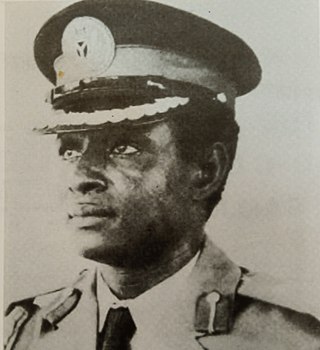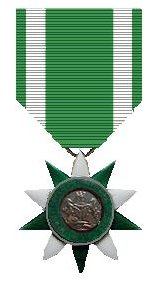 |
|---|
This is a list of the heads of state of Nigeria , from independence in 1960 to the present day. The current constitution of Nigeria has the president of Nigeria as the head of state and government. [1]
Contents
- Monarchy (1960–1963)
- Monarch
- Governor-general
- Republic (1963–present)
- First Republic (1963–1966)
- Military Government (1966–1979)
- Second Republic (1979–1983)
- Military Government (1983–1993)
- Interim National Government (1993)
- Military Government (1993–1999)
- Fourth Republic (1999–present)
- Timeline
- Term of office in years
- Standards
- See also
- Notes
- References
- External links
From 1960 to 1963, the head of state under the Constitution of 1960 was the queen of Nigeria, Elizabeth II, who was also the monarch of other Commonwealth realms. The monarch was represented in Nigeria by a governor-general. Nigeria became a republic within the Commonwealth under the Constitution of 1963 and the monarch and governor-general were replaced by a ceremonial president. Nnamdi Azikiwe served as the only indigenous governor-general of Nigeria.
Since Nigeria became a republic in 1963, 14 individuals have served as head of state of Nigeria under different titles. The incumbent president Bola Tinubu is the nation's 16th head of state. Olusegun Obasanjo and Muhammadu Buhari both served two non-consecutive periods as head of state, first as military officers and then later as civilians. The first ceremonial president, who served during the first republic was Nnamdi Azikiwe, while the first executive president of Nigeria was Shehu Shagari. Shagari was also the first president to be elected to the position. [2]
The interim government of Ernest Shonekan who was deposed 83 days after taking office in 1993 is the shortest in Nigeria's history [3] not including the tenure of Sir James Robertson who served 46 days as governor-general immediately after independence. Johnson Aguiyi-Ironsi served 194 days in the office, the shortest for a permanent head of state. Murtala Muhammed served 199 days in the position. Yakubu Gowon served the longest continuous period of almost nine years before being deposed while he was away from the country in 1975. [4] Olusegun Obasanjo served the longest period for eleven years, two hundred and thirty days combined. [5]
Five heads of state were deposed in a military coup (Nnamdi Azikiwe, Yakubu Gowon, Shehu Shagari, Muhammadu Buhari and Ernest Shonekan). Four heads of state died in office, two were assassinated during a military coup (Johnson Aguiyi-Ironsi [6] and Murtala Muhammed), [7] while two died of natural causes (Sani Abacha and Umaru Musa Yar'Adua). [8] Three heads of state resigned, Olusegun Obasanjo and Abdulsalami Abubakar resigned after transition to democracy in 1979 and 1999 respectively, while Ibrahim Babangida was forced to resign after he annulled the 12 June 1993 presidential election in which SDP candidate Moshood Abiola reportedly won. [9] Olusegun Obasanjo was the first vice president (as Chief of Staff, Supreme Headquarters) to become head of state when Murtala Muhammed was killed during the 1976 coup attempt, [10] while Goodluck Jonathan was the first democratic vice president to become head of state when Umaru Musa Yar'Adua died of Illness on 5 May 2010. [11]


























